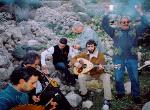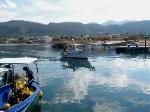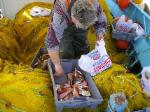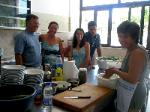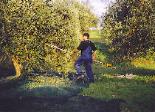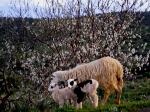email us: info@cookingincrete.com
Copyright © 2009 Nikki Rose. All rights reserved.
Copyright © 2009 Nikki Rose. All rights reserved.
| words to learn to receive welcoming smiles are hello, please and thank you. Half a million people in Crete are happy to teach key words. Seminar attendees enjoyed discussions with musicians and impromptu jam sessions. In a beautiful village in the foothills of Mount Psiloritis, we savored wild herb tea and honey with a fascinating herbalist at her workshop filled with medicinal plants and tonics. We joined chefs and botanists in the countryside to learn about Crete’s amazing and fragile botanical world. Meeting organic vintners for private tours of their wineries was a rare and wonderful privilege. From the outdoor wood-burning ovens of traditional tavernas, we enjoyed tender roast lamb or pork with potatoes and fresh tomatoes filled with seasoned rice (gemista). Other favorite delicacies were gigantes (giant lima beans in an aromatic tomato sauce), cumin-scented braised goat, fresh cheeses and salads. At seaside tavernas, the grilled octopus, sardines, fried calamari and salads quickly vanished from our plates. Many attendees said they ate more fresh produce in one week in Crete than they do in a month at home. The flavor of ripe fruit and vegetables from the garden meters away provides incentives. Note that growing and producing your own food in Crete is not an elitist trend -- it is a time-honored necessity for many families and taverna owners -- heirloom seeds, good weather and grazing land are the basic requirements. Visitors marvel at food sources in Crete -- colorful tapestries of vegetable gardens, vineyards and olive groves blanket the countryside. Small pots of chili peppers border doorways while massive grape vines and fruit trees shade courtyards. One student said, “I cannot believe how much food grows on trees! That olive tree is one thousand six hundred years older than the United States of America!” What is not so obvious, particularly to people that have never needed to grow their own food, is that Crete’s natural resources are at risk due to unsustainable development-tourism-agriculture and climate change. Conservationists- sustainable organic farmers face an uphill battle around the world. This does not make sense, since we all need to eat. If people researched their food sources as thoroughly as they research trendy electronics, they would definitely invest in real and safe food. Professional organic farmers are teachers that can share valuable information, not to mention delicious, healthy and safe food. One visiting teacher said this was the first trip abroad for most of her students and they would not realize their experience in Crete was very special until they traveled elsewhere -- it was so different from standard study tours. Students usually stay in generic hotels or city hostels and are rounded up by the busload to visit major historic sites. What do people learn about the world from a speeding vehicle, or huddled together with 50 to 500 other travelers? The only local dish served at most generic hotels is the global interpretation of horiatiki -- Greek salad. Crete’s heritage stretches far beyond the Minoan civilization. The wonders of the present should not be missed. There’s so much to learn in Crete about sustainable living practices -- and why these common-sense necessities are under constant threat. It’s good that a few educational institutions are choosing to participate in responsible travel/community- based tourism programs. As the buzzword “sustainability” gets tossed around, those concepts need to be packed in suitcases. To sustain something is different from waiting until it is destroyed to react -- like fish floating down the river. Travelers can be active participants of sustainability-in-action that can enrich their lives and help protect our planet for generations to come. After our seminars, I visited a few new organic wineries. High-quality organic wine production is on the rise in Crete, which is very encouraging. If we consider the bigger picture of cultural and natural heritage preservation, this makes perfect sense. Wine has been produced in Crete for over 4,000 years -- about 3,900 years before the use of toxic chemicals in agriculture. One new organic winery overlooks ancient settlements and the gorgeous south coast. The vintners are creating exquisite wines with indigenous grapes. We’ll be visiting them during our seminars next year celebrating the International Year of Biodiversity. A few innovative heritage preservation projects are being developed by young farmers and entrepreneurs. They have firsthand knowledge of the negative consequences of overdevelopment on their island and see their peers trapped in menial jobs at tourist resorts that do not protect or celebrate Crete‘s heritage. Their experience at universities in big cities (food deserts and environmental disasters) was a wake up call. We need to be sure that they have every opportunity to realize their dreams -- to remain in their homeland to pursue meaningful careers that benefit society. We need to invest in the people protecting the real Crete for generations to come -- not tomorrow (avrio) but now (tora!). |
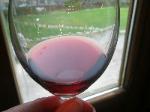
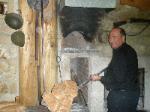

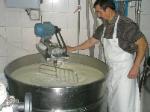
It's a clear and gorgeous autumn day. Taverna and home
verandas are packed with families enjoying a leisurely Sunday
lunch. We're taking advantage of this mild weather after a stretch of
dramatic thunderstorms. The rainy season has finally arrived after
nearly five months of stark sunny skies. We hope we'll have
depends on fresh, clean water.
The olive harvest is underway in some regions. I'm packing as
much organic olive oil as I can into my suitcase for my trip to the
USA next month. My visits with family and friends always revolve
around cooking and eating, which likely has something to do with
my Greek genes. There are a few Cretan ingredients I don't like to
live without -- olive oil and wild oregano top the list. Winter in NE
USA is significantly colder than Crete. I look forward to making
meals that warm my body, ward off colds and lift my spirits.
Last spring, I hit the ground running the moment I returned to
Crete. Over 40 people on the island were involved in our upcoming
seminars. Coordinating the programs with friends that produce
organic olive oil, wine and cheese made up for my 8:00 am to
midnight workdays.
A lot of students and teachers from the USA participated in our
study tours. They met many people dedicated to protecting Crete’s
heritage -- botanists, geologists, historians, mountaineers,
musicians, community-based tourism directors, ecolodge owners,
herbalists, organic farmers, artisan food producers and chefs.
They discovered a little bit about Crete’s culture and nature and
enjoyed fresh and local cuisine along the way. One class filmed
their adventures with us for our documentary. Stay tuned!
Natural Vitamin C Now: Ideal flavor combinations using Vitamin C-packed food to help keep your strength during flu season: Greens braised with olive oil, garlic and fresh lemon juice for extra flavor and protection Quick and rich chicken soup (recipe below) Broccoli with onions, parsley and lemon juice (triple flavor and protection) Smoothies -- berries, citrus juices and yogurt Treat yourself to organic bulk herbal teas -- straight or with honey and fresh lemon juice. |
Join us for one of our fantastic seminars celebrating the International Year of Biodiversity and cultural heritage. Excellent fresh and local cuisine is always on our menu. See our schedule page |
Quick and rich chicken soup (serves 4 people)
excerpt from Nikki Rose's upcoming book
I love homemade chicken soup with a lot of vegetables. Where I live in Crete, there is no such thing as canned chicken
stock at the supermarket. There are salty little cubes available, but they are no substitute for the real deal. When I'm in the
US and don't have time to make homemade stock, this recipe is my solution. There are several options at some
supermarkets now for very rich, organic, low sodium chicken stock. It can be used for many more dishes.
3 Tablespoons extra virgin olive oil
1 medium onion, diced
2 medium carrots, diced
2 cloves garlic, minced
½ teaspoon salt
2 medium-size chicken breasts or 4 chicken thighs, skinned, de-boned and cut into bite-size chunks
1 quart rich chicken stock (low sodium)
1 teaspoon dried thyme
black pepper to taste
1/2 cup fresh parsley, chopped (use half for cooking and reserve half for later)
1-16 ounce can of white beans, rinsed and drained
1/4 cup rice or 1/4 pound of thick egg noodles
1 teaspoon minced chili pepper or ¼ teaspoon of ground cayenne pepper (optional)
1 lemon, juiced (and more lemon wedges to serve if desired)
In a large stockpot over medium-high heat, add the olive oil and heat for 30 seconds. Add the onion, carrots and salt and
sauté until soft but not brown (about 5 minutes). Add the garlic and sauté 2 minutes more, stirring frequently. Add the
chicken and sauté until golden (about 5 minutes). Add the stock, spices, beans, rice or pasta. Stir to combine and bring to
a gentle boil. Lower the heat, cover the pot and simmer the soup, stirring occasionally until the rice or noodles are cooked
(10-20 minutes). If the soup seems too thick for your preference, add a little more stock or water during cooking. Remove
from heat, add the reserved parsley and lemon juice and serve.
Note: Add a cup of chopped fresh greens, frozen peas or other precooked beans to this soup as desired. Kali Orexi!
excerpt from Nikki Rose's upcoming book
I love homemade chicken soup with a lot of vegetables. Where I live in Crete, there is no such thing as canned chicken
stock at the supermarket. There are salty little cubes available, but they are no substitute for the real deal. When I'm in the
US and don't have time to make homemade stock, this recipe is my solution. There are several options at some
supermarkets now for very rich, organic, low sodium chicken stock. It can be used for many more dishes.
3 Tablespoons extra virgin olive oil
1 medium onion, diced
2 medium carrots, diced
2 cloves garlic, minced
½ teaspoon salt
2 medium-size chicken breasts or 4 chicken thighs, skinned, de-boned and cut into bite-size chunks
1 quart rich chicken stock (low sodium)
1 teaspoon dried thyme
black pepper to taste
1/2 cup fresh parsley, chopped (use half for cooking and reserve half for later)
1-16 ounce can of white beans, rinsed and drained
1/4 cup rice or 1/4 pound of thick egg noodles
1 teaspoon minced chili pepper or ¼ teaspoon of ground cayenne pepper (optional)
1 lemon, juiced (and more lemon wedges to serve if desired)
In a large stockpot over medium-high heat, add the olive oil and heat for 30 seconds. Add the onion, carrots and salt and
sauté until soft but not brown (about 5 minutes). Add the garlic and sauté 2 minutes more, stirring frequently. Add the
chicken and sauté until golden (about 5 minutes). Add the stock, spices, beans, rice or pasta. Stir to combine and bring to
a gentle boil. Lower the heat, cover the pot and simmer the soup, stirring occasionally until the rice or noodles are cooked
(10-20 minutes). If the soup seems too thick for your preference, add a little more stock or water during cooking. Remove
from heat, add the reserved parsley and lemon juice and serve.
Note: Add a cup of chopped fresh greens, frozen peas or other precooked beans to this soup as desired. Kali Orexi!
| A special thanks to Katalagari Country Suites for sponsoring our Responsible Travel Workshop. www.katalagarisuites.com |
Winter Newsletter |
